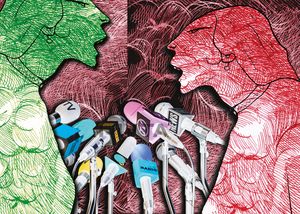The ‘special’ in the special Parliament session was finally revealed. It was not an early election, the announcement of ‘one nation, one election’, or a move to implement the Uniform Civil Code. Instead, the Narendra Modi government made its big move. Twenty-seven years after its inception, the women’s reservation bill has been tabled in Parliament, appropriately in a new building, to mark new beginnings.
Less than 15 per cent of India’s elected parliamentarians are women in a country where they make up nearly half of the population. And, this is the highest representation we have ever had.
For as long as I have been in journalism, I have watched the ritual of the women’s reservation bill being announced with fanfare only to be buried, abandoned, and in some instances, physically mauled by male members who opposed it. As a young reporter who had short hair, I remember being mocked by the Janata Dal (U) leader Sharad Yadav for supporting the bill. “Women like you with short hair are the types to advocate for this law,” he told me. It was his shorthand for elitism and western ideas of feminism.
But there is nothing elite about asking for more political space for women. India’s women are designing space programmes, flying fighter jets, running law firms and banks, leading parades on Republic Day, closing billion dollar deals. In effect they have stormed every bastion except politics. The representation of women in state assemblies is even worse than in Parliament. In 19 state legislatures, less than 10 per cent were women, according to government data released in 2022.
The women’s reservation bill passed the Rajya Sabha in 2010, when the Congress was still in power. It was Sonia Gandhi’s pet project but she could not prevail upon leaders of regional parties like the Samajwadi Party, the RJD and the Janata Dal (U), who were adamant on a sub-quota for Other Backward Classes (OBC). Ironically, an old speech of Mulayam Singh Yadav accused the BJP and the Congress of conspiring together on this issue. But since then the bill went into a deep freeze. Even the issue of women’s political representation fell off the national grid. The Modi government’s revival of the legislation will give it a special place in history. But women will watch with bated breath to see when it actually translates into actionable reality this time.
The fine print (clause five to be precise) in the new bill speaks of how the seats reserved for women will be rotated but only after a delimitation exercise is completed and a fresh census conducted. There is no mention of timelines in the proposed law. And, at least, at the time of writing this column, there has been no clarity about whether the bill aims at a deadline. It is safe to say that if the reservation of women cannot take place before constituency boundaries are re-marked or before a fresh census (the 2021 decadal census has not yet been conducted), then there will be no political reservation before 2024 elections. In fact some say it could even take up until 2029, since as per present law the new delimitation exercise is to take place in 2026.
India’s women have waited close to three decades for this moment. There is no denying the historic value of this moment. This time, let us hope that a finite closure is within reach.
editor@theweek.in


